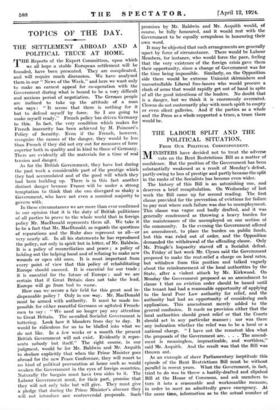TOPICS OF THE DAY.
THE SETTLEMENT ABROAD AND A POLITICAL TRUCE AT HOME.
THE Reports of the Expert Committees, upon which we all hope a stable European settlement will be founded, have been presented. They are complicated, and will require much discussion. We have analyzed them in our " News of the Week," and here we want only to make an earnest appeal for co-operation with the Government during what is bound to be a very difficult and anxious period of negotiation. The German people are inclined to take up the attitude of a man who says : " It seems that there is nothing for it but to defend myself by force. So I am going to make myself ready." French policy has driven Germany to this. In fact, the very condition which makes for French insecurity has been achieved by M. Poincare's Policy of Security. Even if the French, however, recognize the causes of the danger, they would be less than French if they did not cry out for measures of force superior both in quality and in kind to those of Germany. There are evidently all the materials for a time of real tension and danger.
As for the British Government, they have lost during the past week a considerable part of the prestige which they had accumulated and of the good will which they had been building up. There is in this fact another distinct danger because France will be under a strong temptation to think that she can disregard so shaky a Government, who have not even a nominal majority to govern with.
In these circumstances we are more than ever confirmed in our opinion that it is the duty of British politicians of all parties to prove to the whole world that in foreign policy Mr. MacDonald represents them all. We take it to be a fact that Mr. MacDonald, as regards the questions of reparations and the Ruhr does represent us all—or very nearly all. In all his statements he has reproduced the policy, not only in spirit but in letter, of Mr. Baldwin. It is a policy of reconciliation and peace ; a policy of holding out the helping hand and of refusing to make new wounds or open old ones. It is most important from every point of view that this policy of rehabilitating Europe should succeed. It is essential for our trade ; it is essential for the future of Europe ; and we are certain that if Great Britain does not take the lead, Europe will go from bad to worse.
How can we secure a fair field for this great and in- dispensable policy ? Only in one way. Mr. MacDonald must be armed with authority. It must be made im- possible for either resentful Germans or agitated French- men to say : " We need no longer pay any attention to Great Britain. The so-called Socialist Government is tottering. Look how it blunders from day to day. It would be ridiculous for us to be bluffed into what we do not like. In a few weeks or a month the present British Government will not exist. Evidently it repre- sents nobody but itself." The right course, in our judgment, would be for Mr. Baldwin and Mr. Asquith to declare explicitly that when the Prime Minister goes abroad for the new Peace Conference, they will resort to no kind of political provocation at home such as would weaken the Government in the eyes of foreign countries. Naturally the bargain must have two sides to it. The Labour Government must, for their part, promise that they will not only take but will give. They must give a pledge that during the Prime Minister's absence they will not introduce any controversial proposals. Such promises by Mr. Baldwin and Mr. Asquith would, of course, be fully honoured, and it would rest with the Government to be equally scrupulous in honouring their own word.
It may be objected that such arrangements are generally upset by force of circumstance. There would be Labour Members, for instance, who would force the pace, feeling that the very existence of the foreign crisis gave them their opportunity, since a change of Government was for the time being impossible. Similarly, on the Opposition side there would be extreme Unionist skirmishers and uncontrollable Liberal free-lances who would procure a clash of arms that would rapidly get out of hand in spite of all the good intentions of the leaders. No doubt that is a danger, but we think it is enormously overrated. Clowns do not customarily play with much spirit to empty or even silent galleries. And if the parties as a whole and the Press as a whole supported a truce, a truce there would be.










































 Previous page
Previous page